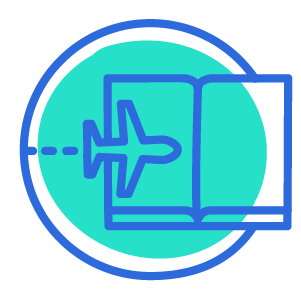Guide to Language Schools Abroad
Imagine yourself savoring national dishes, dancing to local radio hits, mapping the city by taking public
transportation, shopping the neighborhood markets – and understanding it all! Learning a new language is a fun
way to get to know an unfamiliar place and really embrace the excitement of travel.
Whether you enroll into a traditional language course at a university, or leave the classroom in an immersion
program, learning a new language is a great skill to gain abroad!
How to Find a Language School
Learning a new language abroad is a fantastic way to immerse yourself in a culture while picking up skills that
can open doors personally and professionally. Here’s how to get started:
-
Consider your goals:
How proficient do you want to become? How much time can you dedicate to learning a new language?
-
Choose a destination:
Go where this language is widely spoken! Also consider what environment you want to explore and live in while
you study.
-
Research programs:
There are many different types of language learning programs out there for all different types of learners.
Here at Go Overseas, you can search for language programs abroad, filtering by country or language. You can
also read reviews for those programs written by real, verified alumni.
Should you do a traditional language course or immersion program?
Ask any multilingual traveler and they’ll agree that language immersion is the best way to master a new
language. Immersion places you right in the heart of the community and culture, and teaches you situational
colloquialisms that a language textbook could never fully explain.
However, a hybrid program (classroom and immersion!) will get you speaking a new language quicker and more
consistently – The choice is up to you and your goals!
Benefits of Learning a Language Abroad
There are many benefits of learning a new language. From becoming a better traveler to increasing your job
prospects, here are some benefits of learning a language abroad.
-
It makes traveling easier. When you are able to ask for directions, order food, and speak the official tongue
of a destination, you’ll be able to communicate more effectively (and better prevent the chances of getting
scammed!)
-
Multilingual professionals with a qualifying education often earn more money in the workforce – bilingualism
is highly valued.
-
The likelihood of scoring an international job (or gig that pays you to travel the world) is much higher if
you can speak more languages!
Language learning also exercises our brain, improves our memory, and opens doors to cross-cultural understanding.
Where to Learn a New Language Abroad
There are thousands of languages spoken around the world! If you’re looking to travel and learn a new language,
here’s a quick guide to help you select
where to study a language abroad!
You can learn a language abroad with a private language program, enroll in a local university, take online
classes, or fully immerse yourself in local culture. The way you learn it is entirely up to you!
Cost to Learn a Language Abroad
The cost of learning a language abroad depends on the location, type of program or language school, and duration.
As a student abroad, you’ll need to factor expenses such as tuition and program fees (which may or may not
include accommodation), flights and travel insurance, and your living expenses which covers meals,
transportation and entertainment.
A more affordable option is to apply for an online course, however learning a language abroad allows you to
become fluent quicker and the opportunity for cultural immersion – which is huge if you are interested in
working or living in that country!
You can also apply for
study abroad scholarships and grants! Many
organizations, like DAAD in Germany, and
program providers offer language-learning scholarships for international students.
How to use Go Overseas
Go Overseas is your go-to source for trusted travel programs. Explore thousands of vetted options and get the guidance you need to feel confident and excited about culturally-immersive experiences abroad.
Here’s how to use GO to plan your next adventure:
- Explore 16,000+ programs: Narrow your search results by using filters, such as program type, location, and length.
- Compare 46,000+ reviews: Real people have gone on these programs, and have unique experiences to share. Read their reviews to learn what it’s truly like to live and learn abroad!
- Read alumni interviews: Hear personal stories and in-depth accounts from fellow travelers just like you!
- Browse community photos: Dive into photos of real experiences from our community of travelers. From mouthwatering meals and cozy accommodations, to breathtaking adventures and new friends, our galleries bring the journey to life. Start picturing your story abroad!
- Wish List 💙: Not ready to commit to a program? Click the Wish List heart icon to bookmark programs and save them for later. Then, compare programs side by side.


























